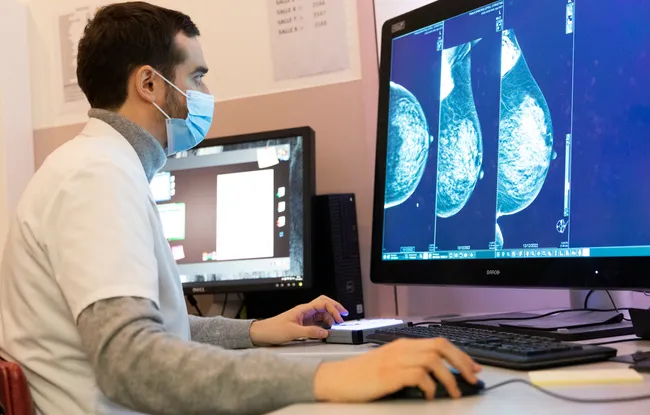- Home >
- Patients and Care >
- Cancer types >
- Breast cancer >
- Symptoms and diagnosis
Breast cancer

- Definition
- Symptoms and diagnosis
- Treatments
- After breast cancer
- Support care
- Breast cancer research
- Medical team
- Clinical trials
Symptoms and diagnosis of breast cancer
At the beginning of the disease, breast cancer often goes unnoticed. It can then only be detected thanks to a screening mammogram (offered free of charge every two years to women aged 50 to 74). In the more advanced stage, a lump may be palpable in the breast. It is usually not painful but is hard to the touch and seems attached to the tissue. A lump in the armpit, a change in the shape or appearance of the breast, the skin or the nipple, as well as a discharge from the nipple (sometimes tinged with blood), can also be symptomatic of the disease.
A mammogram, possibly followed by an ultrasound scan or more rarely an MRI, makes it possible to make a first diagnosis. By analyzing the images transmitted by City Medicine, the expert radiologists at Institut Curie detect an associated cancer in 10% of cases (either in the originally diagnosed breast or in the other one), which significantly changes the treatment plan and increases the chances of patient recovery.
Microscopic examination of the cells of the identified mass is essential to confirm the diagnosis. Cells can be collected using a fine needle (called a cytological puncture) or during biopsies performed under local anesthesia and guided by imaging.
Risk factors for breast cancer
Almost 80% of breast cancers develop in women over the age of 50, thus making age a risk factor. But there are other risk factors, such as alcohol and tobacco consumption, obesity, or lack of physical activity. In addition, 13 genes have been identified as a predisposition to breast and ovarian cancers, including the BRCA1 and BRCA2 genes.
Institut Curie, a pioneer in oncogenetics, provides support for families in which such mutations are suspected in order to confirm or dispel doubts. Women at risk benefit from consultations with genetic counselors, as well as personalized monitoring (a clinical examination every six months and a medical imaging examination every year). In high-risk cases, prophylactic surgery combined with psychological monitoring may be performed.
Institut Curie, the leading cancer center in France

- 50€
- 100€
- 150€
- 500€
- Montant libre
After tax deduction, your donation costs you 51.00€

